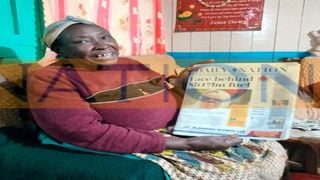
Pauline Wanjiru Njoroge, 71, mother of businesswoman Ann Njeri, who has been in the news for the past week over the ownership of the disputed Sh17 billion oil shipment. She is surprised to learn from the media that her first-born daughter, aged 55, is filthy rich.
| Simon CiuriOur Columnists
Premium
Njeri’s mother interview: Another case of media owing a duty of care
Would a 71-year-old mother talk about her daughter in the language used in the story “I didn’t know my daughter is filthy rich"? That’s the question that troubled Elijah Keger after he read the story about Pauline Wanjiru Njoroge that was published in the Daily Nation on Friday last week.
Ms Wanjiru is the mother of Ann Njeri Njoroge, the 55-year-old businesswoman who claims to be the owner of the controversial Sh17 billion diesel shipment. Mr Keger suggests that the Nation line of questioning in the interview and the choice of statements published are unethical.
Another reader, Githuku Mungai, however welcomes the interview, saying the mother “opened up”. This is a story, he said, that people will read “with the eyes glued to the paper”. Mr Mungai is right. The story went viral. Although it was exclusive to the Nation, other media eagerly picked it up.
Back to Keger’s ethical question. Should the Nation give readers what they want or what they need? That is a great question—but for another day. Our concern now is whether the Nation portrayal of Wanjiru is unethical and insensitive.
The story is similar to that of Pauline Waithira, published by the Nation in August this year. Popularly known as ‘Mama Mboga’, she was a poster girl for UDA during the election campaigns last year. She claimed in an interview that the ruling party used and dumped her. But she recanted the interview a few days later, apparently as a result of a backlash from UDA.
Victim of her own inexperience
In a commentary, I suggested that Waithira was a victim of her own inexperience in being interviewed by the media (“Journalists owe a duty of care to people new to being interviewed”—Daily Nation, Aug. 11, 2023).
In the present case, Wanjiru says, or was persuaded to accept, that her daughter “is filthy rich”. She also says other negative things about her daughter, including that she was a school dropout, a failure in marriage and illiterate in maths.
The Nation story, also broadcast by NTV, seems to suggest one of the purposes of the interview was to find out whether the “billionaire” daughter was taking care of her mum. Personally, I was literally swept away by Wanjiru’s account of her relationship with her daughter. It was as if I was caught up in flash floods at Hell’s Gate.
You need to read the Nation interview in full—“I didn’t know my daughter was so rich”, published in the Daily Nation of November 17, 2023—to appreciate what I am saying.
Wanjiru sounded like she was manipulated to say things detrimental to her relationship with her daughter. She even posed for a picture of herself, smiling while holding a copy of the Nation that featured her daughter on the frontpage. Was she in control of the interview? No way!
Let’s be clear. Privacy is at issue in the Wanjiru story—just as it was in the Waithira story. The Constitution is also clear on this: Every person has the right to privacy, which includes the right not to have information relating to their family or private affairs unnecessarily revealed. It’s the right to be free from unwarranted publicity, which is fundamental to the notion of dignity and freedom of the individual.
The fact that Wanjiru agreed to be interviewed doesn’t take away that right. In fact, the Code of Conduct for the Practice of Journalism in Kenya provides that the public’s right to know should be weighed against the privacy rights of people in the news.
We have many examples of journalists contravening this provision. Just to mention a notable one: In 2009, two Kenyans, Charles Ngengi and Daniel Chege Gichia, married in London under a UK law that recognises gay marriages. The Nation went deep into Murang’a to interview their parents. But they were clueless about gay marriages.
However, as a result of the interview, the parents were targeted by Mungiki and homophobic neighbours, who gave them a two-week ultimatum to leave the village (“Leave us alone, says gay Kenyan couple” —Nation. Africa, Oct. 24, 2009).
Ethics require journalists to avoid harm to the subjects and third parties of their reporting. Pursuit of the news is not a licence for undue intrusiveness and insensitive reporting when dealing with subjects who are not media-savvy.
- The Public Editor is an independent news ombudsman who handles readers’ complaints on editorial matters, including accuracy and journalistic standards. Email: [email protected]. Call or text 0721989264.





